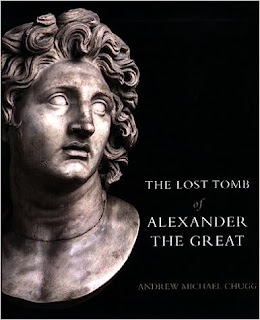After Fire from Heaven, one would automatically expect Mary Renault to write a sequel to the years of young Alexander, and she did, yet in a most unexpected way. Instead of picking up the story of Alexander when he leaves for Asia, she skips over right to the heart of Persia from where his conquests are followed from afar by a eunuch called Bagoas, The Persian Boy (ISBN 0394751019). In fact she starts the book telling Bagoas’ life from the very beginning, making it an interesting reading on castration and the general role of eunuchs in that part of the world.
I know many people read this book for that purpose only or for what we call nowadays a homosexual relation. In ancient Greece neither the word nor the concept were known. Sex was simply sex without the fringes and the constraints that Christianity and other religions brought forward. It may be useful to point out here that in antiquity eunuchs were not only slaves serving the pleasure of their master, but that they also could occupy high placed positions often that of a valuable “contact person”. As a simple example, I’m thinking of another eunuch Bagoas (often mentioned more elegantly as Vizier) who assassinated King Artaxerxes III to rule himself through puppet kings – a proof, if needed, of the power some eunuchs could acquire. If we believe Andrew Chugg in his book Alexander’s Lovers (and there is no reason not to believe him) our Persian Boy may well have acted as special envoy or master of ceremony at Alexander’s Persian Court since he was familiar with all the finesses of the Persian protocol.
Whatever the reader’s opinion on this matter, to me Mary Renault’s book is about Alexander the Great. Bagoas is brought to him as a gift by Nabarzanes who in exchange is hoping to be looked upon mildly by this new ruler since he was closely involved in the murder of King Darius in Parthia in the year 330 BC.
I marvel at Mary’s dexterity in comparing and differentiating Persian customs from the Macedonian ones, as Bagoas discovers this new world around him. In his eyes, the Macedonians are perceived as Barbarians with their lack of respect for the person of the king as initial focal point and their overall lack of social graces. For us Westerners, as we have been raised with the concept that our civilization started in Greece, it comes as a surprise to learn that there is an other version to the story – in this case to history, for here we are looking towards the West from the East. It is quite interesting to witness Alexander’s eagerness to learn, which I think is a very honest and true trait of his character, but also the subtle and styled way in which Bagoas is introducing his master to Persia – a land that must have looked to the new conquerors like the New World to our Pilgrim Fathers setting sail for the Americas.
Unlike in Fire from Heaven, this book is no longer focusing exclusively on Alexander’s relationship with Hephaistion, which by the way takes another dimension as both men become more mature, but as can be expected on his relationship with Bagoas. Yet Mary Renault manages to keep up with Alexander’s campaigns as he marches on over the Hindu Kush to Bactria, crossing India’s wide streams and ultimately the death march through the Gedrosian Desert back to Babylon. The daily events become all very personal and make the reader very much part of life in and around the royal tent. It is fascinating to look on to the battles and the internal conflicts from the sideline where Bagoas keeps himself without losing the context of all the historic events as they occur. Their description is so vivid that you can almost taste the dust and feel the cold!
A true masterpiece, worthy of Mary Renault. I would even add worthy of Alexander the Great.
Also available as e-Book
Also available as e-Book


